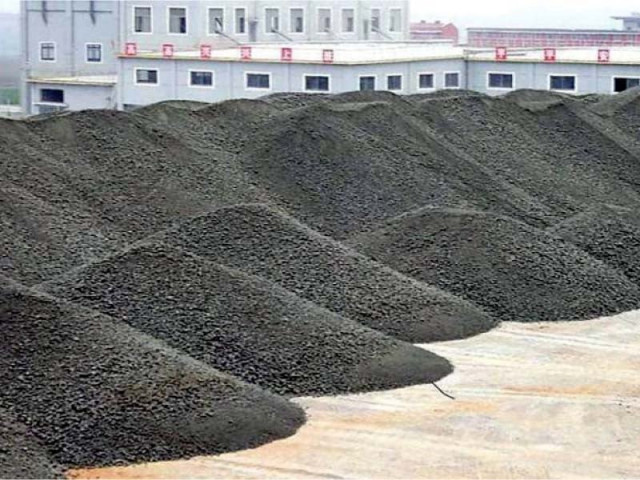Plants accused of overcharging for low-quality coal
Revelations emerge at public hearing sparking concerns over quality, transparency

Shocking revelations emerged during a public hearing on coal pricing mechanisms, indicating that coal power plants in Pakistan are manipulating coal prices by importing lower-quality coal for their operations.
In a significant disclosure, it was revealed that the Sahiwal coal power plant had procured coal at a time when coal prices were high and maintained an inventory that was ultimately unused due to merit order. What raised concerns among the authorities was that these power plants were not claiming capacity payments, which should have been recovered from power consumers.
During the public hearing, it came to light that these coal-based power plants had initially committed to using coal with 6000 calorific values (CVs). However, they had been importing coal with CVs ranging from 4500 to 5500. Despite utilising off-spec coal, they continued to charge the price of higher-quality coal.
“The price should be based on off-spec coal, but they were demanding rates for 6000 CVs,” revealed information presented during the public hearing. Participants stressed that prices should be scaled down according to the quality of coal.
Additionally, it was disclosed that these coal power plants had signed agreements with traders, whereas such agreements should have been made directly with coal mine owners. These plants were receiving various discounts related to CVs, sulphur, and moisture but were unwilling to pass these discounts on to power consumers.
Payment of coal imports in Chinese currency
The public hearing also highlighted issues related to the payment of coal imports, particularly the exchange rate and the opening of Letter of Credits (LCs). Officials from the power division indicated that a few Chinese banks were prepared to open LCs in Chinese Renminbi (RMB), and coal-based independent power plants (IPPs) should consider using RMB for their transactions. They suggested conducting these transactions in RMB to address the challenges posed by exchange rates.
Pakistan has already opened LCs in Chinese banks to import crude oil from Russia.
Coal import through spot purchases
Another significant discussion during the hearing was the possibility of importing coal through spot purchases. According to power purchase agreements signed with imported coal-based power plants, IPPs can import 10% of coal through the spot market. However, the regulatory authority suggested increasing this share from 10% to 20% and encouraged coal imports through a competitive bidding process from both local and international markets.
Representatives from coal-based IPPs explained that they had long-term contracts with coal suppliers and, therefore, determined prices through negotiations. They also mentioned issues related to API 4 differentials, emphasising that sudden deductions had been made without prior notice, affecting 44 ships. The coal-based IPPs stressed that the spot market alone could not meet their coal needs, pointing out the presence of small, inexperienced coal suppliers in the market.
Regarding the procurement of coal from the spot market, an IPP representative explained that according to the Power Purchase Agreement (PPA), 10% of coal would be procured from the spot market, with the remaining procurement being done through long-term contracts as stipulated. She expressed confusion about the sudden proposal to increase spot market procurement to 20%, which deviates from the 10% requirement in the PPA.
“Why is this question arising now?” she questioned, suggesting that the Nepra consultant might not have a complete understanding of the situation. “The entire process will face disruption if we are directed to rely more on the spot market,” she emphasised.
Maintaining coal inventory
National Electric Power Regulatory Authority (NEPRA) officials pointed out that coal plants had maintained an inventory of coal that was procured at a high price but remained unused. “You stockpiled coal but did not utilize it,” Nepra officials remarked.
The management of the Port Qasim coal plant revealed that they had not provided profits to shareholders since the project became operational. They discussed the complexities of the coal import tendering process, highlighting the involvement of performance guarantees and liquidated damages (LDs) to ensure an uninterrupted coal supply chain.
They also raised concerns about the availability of Australian coals, indicating that the demand for Australian coal was high, primarily serving countries like Japan and Vietnam. They added that there were no discounts available on Australian coal, making it an unattractive option for IPPs.
Exchange rate volatility and other challenges
Furthermore, the representatives discussed the issue of exchange rate volatility. They raised questions about the Nepra consultant’s reports and the application of indexation differential without a formal hearing.
Regarding concerns about higher inventory and capacity payments, the IPPs clarified that most of these payments are directed towards lenders. Nepra stated that the price differential was $129 in September 2022.
The API 4 price is calculated as the one-month average coal price in South Africa’s total trading, according to power division officials. Coal-based power plants in Pakistan import coal from South Africa based on this formula. Currently, coal agreements are linked to API 4, and coal suppliers are not inclined to provide a differential, they said.
Published in The Express Tribune, September 22nd, 2023.
Like Business on Facebook, follow @TribuneBiz on Twitter to stay informed and join in the conversation.


1733130350-0/Untitled-design-(76)1733130350-0-208x130.webp)
















COMMENTS
Comments are moderated and generally will be posted if they are on-topic and not abusive.
For more information, please see our Comments FAQ